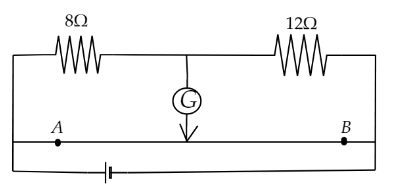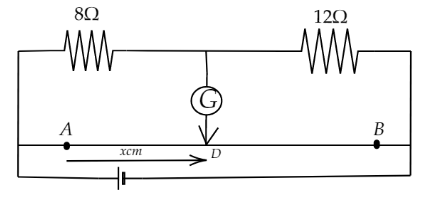Question
Question: The potentiometer wire AB shown in figure is \[40\,cm\] long. Where should the free end of the galva...
The potentiometer wire AB shown in figure is 40cm long. Where should the free end of the galvanometer be connected on AB so that the galvanometer may show zero deflection?

Solution
Use Wheatstone bridge principle at null condition to find the length of the wire at null condition. Wheatstone bridge principle says that the ratio of the resistances at null condition is equal.
Formula used:
According to the Wheatstone bridge principle at null condition,
QP=SR
where P is the resistance at first arm, Q is the resistance at second arm, R is the resistance at third arm and S is the resistance at third arm.
Complete step by step answer:
We have given here a potentiometer of length 40cm which has resistance 8Ω and 12Ω. Now, the current through the galvanometer is zero for zero deflection of the galvanometer. Now, since there are two resistances connected to it, the potentiometer acts like a Wheatstone bridge. Now, we know that the in Wheatstone bridge null condition current through the galvanometer is also zero.
From, Wheatstone bridge principle we have,
QP=SR
where P is the resistance at first arm, Q is the resistance at second arm, R is the resistance at third arm and S is the resistance at third arm.

now, let the null point be at xcm from point A. So, resistance of the length DB will be (40−x)cm
Now, from Wheatstone bridge principle we can write,
128=40−xx.
So, upon simplifying we have,
12x=320−8x
⇒20x=320
∴x=16
Hence, the null point of the galvanometer will be at 16cm from the point A.
Note: The Wheatstone bridge principle has several from finding unknown resistance to unknown voltage the Wheatstone bridge principle is widely used. The dimension of the resistance used must be of low resistance to operate the potentiometer accurately since the resistance of the potentiometer wire is low.
